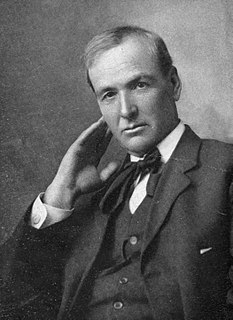A Quote by William Graham Sumner
Every man and woman in society has one big duty. That is, to take care of his or her own self. This is a social duty. For, fortunately, the matter stands so that the duty of making the best of one's self individually is not a separate thing from the duty of filling one's place in society, but the two are one, and the latter is accomplished when the former is done
Related Quotes
You know, that man has a spirit, that each man and woman is unique, that we have duty to promote our unalienable rights and to protect them, that we have a duty to our families and ourselves, to take care of ourselves, to contribute to charity, that we have a duty to support a just and righteous law that is stable and predictable.
Always 'duty.' I am sick of the word. They are a lot of old blockheads in flannel vests and of old women with foot-warmers and rosaries who constantly drone into our ears 'Duty, duty!' Ah! by Jove! one's duty is to feel what is great, cherish the beautiful, and not accept all the conventions of society with the ignominy that it imposes upon us.
I believe that the community's duty to education is, therefore, its paramount moral duty. By law and punishment, by social agitation and discussion, society can regulate and form itself in a more or less haphazard and chance way. But through education society can formulate its own purposes, can organize its own means and resources, and thus shape itself with definiteness and economy in the direction in which it wishes to move.
I learned from my illiterate but wise mother that all rights to be deserved and preserved came from duty well done. Thus the very right to live accrues to us only when we do the duty of citizenship of the world. From this one fundamental statement, perhaps it is easy enough to define the duties of Man and Woman and correlate every right to some corresponding duty to be first performed. Every other right can be shown to be a usurpation hardly worth fighting for.
Kant does not think there is anything wrong with being beneficent from sympathy. He thinks we have a duty to cultivate sympathetic feelings by participating in the situations of others and acquiring an understanding of them. He thinks we also have a duty to make ourselves into the kind of person for whom the recognition that something is our duty would be a sufficient incentive to do it (if no other incentives were available to us). That's what he means by "the duty to act from the motive of duty".



































